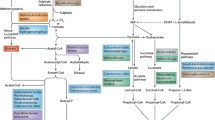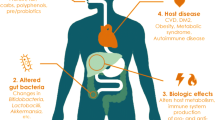Summary.
Dietary carbohydrates that escape digestion in the small intestine, undergo bacterial fermentation in the colon. This process affects the microbial ecology of the gastrointestinal tract and influences gut metabolism and function. Prebiotics are non-digestible but fermentable oligosaccharides that are specifically designed to change the composition and activity of the intestinal microbiota with the prospect to promote the health of the host. Dietary fiber and non-digestible oligosaccharides are the main growth substrates of gut microorganisms. Their fermentation results in the acidification of the colonic contents and the formation of short chain fatty acids which serve as fuels in different tissues and may play a role in the regulation of cellular processes. Prebiotics specifically stimulate the growth of endogenous microbial population groups such as bifidobacteria and lactobacilli which are perceived as being beneficial to human health. In spite of the interesting nutritional properties of prebiotics it is questionable whether a wholesome diet rich in fruit and vegetables needs to be supplemented with prebiotics for optimal health effects.
Similar content being viewed by others
Author information
Authors and Affiliations
Rights and permissions
About this article
Cite this article
Blaut, M. Relationship of prebiotics and food to intestinal microflora. Eur J Nutr 41 (Suppl 1), i11–i16 (2002). https://doi.org/10.1007/s00394-002-1102-7
Issue Date:
DOI: https://doi.org/10.1007/s00394-002-1102-7




